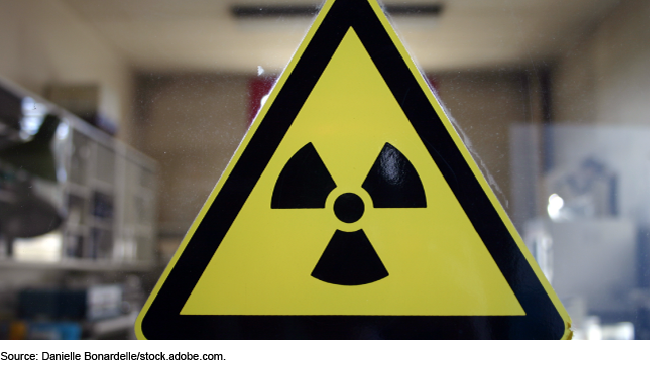Preventing a Dirty Bomb: Nuclear Regulatory Commission Has Not Taken Steps to Address Certain Radiological Security Risks
Fast Facts
In terrorists' hands, even small amounts of radioactive material could be used to make a dirty bomb. Over the past decade, we've made 18 recommendations to the Nuclear Regulatory Commission that would strengthen its security requirements for these materials. But more than half of those recommendations haven't been implemented.
We now ask that Congress consider directing NRC to strengthen its requirements. This would include accounting for any potential social and economic consequences of a dirty bomb detonation in its decision-making, and updating its security requirements accordingly.

Highlights
What GAO Found
Agencies whose missions include radiological security share generally similar assessments of radiological threats and vulnerabilities. But these agencies differ in the extent to which they consider socioeconomic consequences (e.g., denial of access to property, economic loss, and cleanup costs) in their assessment of risk, affecting their security activities. Specifically, the National Nuclear Security Administration (NNSA) and the Department of Homeland Security's Countering Weapons of Mass Destruction Office (CWMD) pursue security activities based on a view of risk that includes primary consideration of the significant socioeconomic damage a dirty bomb can cause. The Nuclear Regulatory Commission (NRC) does not do so. Instead, it considers certain fatalities and health effects as the consequences of concern for the purposes of establishing its regulations. These differing focuses with regard to the consequences of a dirty bomb have resulted in NNSA and CWMD designing programs to secure radioactive materials that NRC regulations leave vulnerable.
The Three Elements of Radioactive Material Risk

NNSA, CWMD, and U.S. Customs and Border Protection (CBP) have implemented almost all of the actions GAO has recommended to reduce the risk of a dirty bomb. By contrast, NRC has not implemented the majority (11 of 18) of GAO's recommendations made between 2012 and 2024. Specifically, NRC has not taken actions to incorporate consideration of socioeconomic consequences into its regulations. It also has not strengthened the security of certain radioactive materials not subject to NRC's enhanced security requirements (“category 3” materials), such as by centrally tracking category 3 sources and licenses. In June 2024, NRC confirmed that nearly all action to implement these recommendations had ceased subsequent to a Commission vote not to proceed with a draft rule that would have addressed certain recommendations to better secure category 3 materials.
Why GAO Did This Study
Terrorists' ability to obtain radioactive materials for use in a radiological dispersal device—also known as a dirty bomb—has been of particular concern for federal agencies since the attacks of September 11, 2001. Such a device could cause significant socioeconomic damage, including long-term economic lockout of the affected area. Among federal agencies, NRC, NNSA, CWMD, and CBP play key roles supporting U.S. domestic radiological security.
GAO was asked to review federal government efforts to protect the homeland against dirty bombs. This report examines (1) how key federal agencies' views of risk inform their security activities, and (2) the extent to which the agencies have taken actions GAO has recommended to protect against a dirty bomb. GAO reviewed NRC, NNSA, CWMD, and CBP documentation and interviewed agency officials about how these agencies' views of risk inform their efforts, and about progress made addressing GAO's recommendations to date.
Recommendations
Congress should consider directing NRC to (1) incorporate socioeconomic consequences into relevant decision-making and regulations, and (2) require that all category 3 radioactive materials and licenses be centrally tracked and all category 3 licenses be subject to stronger verification measures. NRC neither agreed nor disagreed with GAO's report. GAO maintains that actions are needed.
Matter for Congressional Consideration
| Matter | Status | Comments |
|---|---|---|
| Congress should consider directing NRC to incorporate socioeconomic consequences into NRC's decision-making for setting security measures for radioactive materials, and direct NRC to update its regulations accordingly. (Matter for Consideration 1) | On February 6, 2025, the Securing our Radioactive Materials Act (H.R. 1636, 119th Cong.) was introduced and referred to the House Committee on Energy and Commerce. Among other things, this bill would direct the Nuclear Regulatory Commission to incorporate socioeconomic consequences into relevant decision-making and regulations. No further action has been taken on this bill since it was introduced and referred to committee. Therefore, as of February 6, 2026, this matter remains open. Addressing this matter could help reduce the risk of a dirty bomb. | |
| Congress should consider directing NRC to immediately require that all category 3 licenses be added to the Web-based Licensing System, all category 3 sources be included and tracked in the National Source Tracking System, and that all vendors verify the legitimacy of would-be purchasers' category 3 licenses with the regulator. (Matter for Consideration 2) | On February 6, 2025, the Securing our Radioactive Materials Act (H.R. 1636, 119th Cong.) was introduced and referred to the House Committee on Energy and Commerce. Among other things, this bill would direct the Nuclear Regulatory Commission to require that all category 3 radioactive materials and licenses be centrally tracked and all category 3 licenses be subject to stronger verification measures. No further action has been taken on this bill since it was introduced and referred to committee. Therefore, as of February 6, 2026, this matter remains open. Addressing this matter could help reduce the risk of a dirty bomb. |
